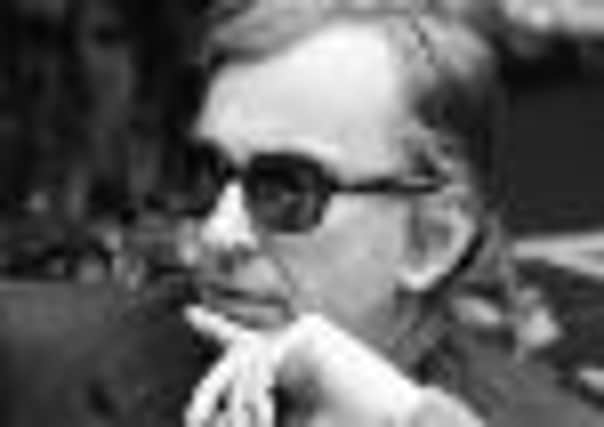George Kerevan: The surrogate politician who talked the talk


I’M NOT sure the generation now coming of age in the new century will understand the acres of print devoted to the passing of American novelist Gore Vidal. Or comprehend why, for certified post-war baby boomers like myself, he remains an icon despite his legendary narcissism and (not always justified) intellectual arrogance.
I don’t think the 21st century will be kind to Vidal’s reputation. True, he was a celebrated wit with an acerbic tongue. When rival novelist Norman Mailer decked him at a party, Vidal looked up from the floor and pronounced: “Once again, words fail Norman Mailer”.
Advertisement
Hide AdAdvertisement
Hide AdBut the ability to find a withering one-liner is not enough to get you remembered. Humour rarely survives the change of generations because it needs context.
Vidal was also too much of an intellectual gadfly for his own good. His voluminous (excessive?) output of books, screenplays and plays cover every genre from crime thriller to satire. Not all of them are worth remembering. He could craft an elegant sentence but not all those sentences lead to a conclusion.
Despite literary fame and the ability to command talk-show sofas for 60 years, Vidal suffered from what he called “divine discontent”. Herein lies the secret contradiction of Vidal, who at 14 changed his first name from a mundane Eugene, to Gore, after his senator grandfather, TP Gore. Vidal was a lifelong frustrated politician for whom writing ultimately proved a poor surrogate for power.
For this reason, his best novels are his cycle of histories of the rise and (in his eyes) fall of the American Republic. His most successful play is The Best Man, the first “warts and all” look at the corrupt reality of a US presidential campaign. It was written in 1960, coinciding with Jack Kennedy’s election (won through ballot-stuffing in Chicago), and now has been revived on Broadway with James Earl Jones and Cybil Shepard. For a play still to be relevant half a century after it was written is perhaps the best tribute to Vidal’s genius.
Vidal failed to win election to Congress in 1960 in a traditional Republican district, though he did better than previous Democrats. At the height of the Vietnam War, he chaired the new People’s Party, which called for an end to the conflict, gay rights, and a maximum (yes, maximum) wage. By 1982, he was back with the Democrats, trying to secure the nomination for senator in California. He came a poor second.
In retrospect, there was never any chance that Vidal possessed the discipline to be an elected politician. Mind you, the fantasy of him running on an anti-war platform against Richard Nixon in 1972 gives me goose pimples. Tightly-wound Nixon might have self-destructed under Vidal’s verbal assaults.
Politics’ loss was literature’s gain. Vidal went on to write his seven-volume Narratives of a Golden Age, charting the history of the United States from the Revolution to Roosevelt. Few writers are good at tackling politics. They can’t make Cabinet meetings interesting. The major exceptions are Shakespeare, Aaron Sorkin (who wrote The West Wing) and Vidal. That is why Gore Vidal will still be read, not as a literary stylist but as the chronicler of American power.
The plot of Vidal’s American cycle is the modern corruption of the democratic ideals of the early Republic. Quipped Vidal: “The United States was founded by the brightest people in the country – we haven’t seen them since.” America’s elite, he thought, had been seduced by dreams of world empire after the Civil War militarized US politics. The rise of Hollywood and the mass media gave that elite a tool to manipulate the voters, turning democracy into a farce.
Advertisement
Hide AdAdvertisement
Hide AdFor Vidal, the original Republic was a grand idea based on equality and democracy – though, iconoclast to the end, he represents most of the founding fathers as flawed. But this American ideal has been subverted in the 20th-century quest for “murderous empire” with its “military economy”. The Republic has been mislaid and America is adrift on the sea of history with nowhere to go.
Vidal summed up his views by quoting John Quincy Adams, America’s sixth president. In 1821, Adams was asked whether the United States should join Britain in forcing the Ottoman Turks to give Greece independence.
Adams answered that the United States “goes not abroad in search of monsters to destroy. She well knows that by once enlisting under other banners than her own, were they even the banners of foreign independence… the fundamental maxims of her policy would insensibly change from liberty to force. She might become the dictatress of the world. She would be no longer the ruler of her own spirit.”
Such beliefs made Vidal the bête noire of US conservatives – not to mention his lifelong public advocacy of gay rights, starting in the 1940s when even to mention homosexuality was to court ostracism. While the American Right found it easy to attack Vidal’s homosexuality, it was flummoxed by his use of the American dream to criticise the neo-con establishment from the left. They’ve never come up with a convincing riposte.
Of course, Vidal’s critique of America is too crude, but then he was an artist, not a politician. America, with its globalised economy, cannot live in splendid isolation from the rest of the world.
Yet Vidal was correct in suggesting there is a conceit of power among the American elite, and that poorly informed US politicians frequently translate domestic interests into foreign policy, with dire consequences. They are about to do the same with China. Obama just ordered most of the US fleet into the Pacific, an election year stunt that will only inflame Chinese nationalism. If that’s Obama, just imagine what Mitt Romney might do?
So farewell Gore Vidal, the fastest mouth in the west. You reminded us of why America truly is great – or should be.